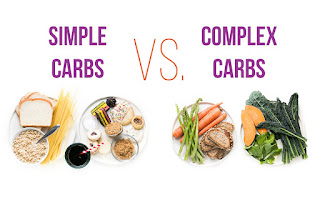The Debate on Carbohydrates
Getting
different information from many different areas can be confusing. Here is a
little bit of information that can help answer some questions you may have
about carbs.
So, let’s
start off with ‘what are carbs?’
The body
uses carbs, fats, and proteins for energy, but carbs are our body’s #1 choice
for energy. Carbs can be broken down into two groups: simple and complex carbs.
Simple
carbs break down fast in the body and consist of white breads, pastries,
candies, and cereals. We think of these more as our “sugars.” When eating this
kind of carb, our blood sugar rises quickly and gives us “quick energy.” Simple
carbs are usually the reason for causing a “sugar rush” when they are eaten in
bigger sizes. These can be a great go-to source of energy before activities
such as hiking, swimming, or biking. A lot of times they are called the “bad
carbs.” This is because if the energy from the carb is not used right away, overtime
it can be stored as fat and cause weight gain.
Complex
carbs take a longer amount of time to break down in the body and include a lot
of foods such as oatmeal, whole grain pasta, beans, and sweet potatoes. Fiber
is one of the big parts that make up complex carbs. Fiber can help with easy
digestion, reduce cholesterol, and keep you fuller for a longer period of time.
These are usually called the “good carbs” because of the good vitamins and
minerals they have as well as “steady state” energy.
Now let’s
dig a little deeper into how many carbs we need.
Think of
your body like a car. A car needs gas in order to get from point A to point B.
When the car is running low on fuel, it does not work like it should; and the
longer the car goes, the more fuel it needs. There are also different types and
sizes of cars that use their gas at different rates.
Our bodies
are very similar. We need carbs as our main fuel source for daily activities,
but the amount of carbs differs from person to person. The more active a person
is, the more servings of carbs they will need. Someone who is not very active
in their typical day, will not require as many servings of carbs.
Here are
some typical servings of carbs:
Carbs are
not “good,” nor “bad.” The amount and type of carbs we eat help decide the fate
of the carbohydrate. Each person is different and the amount of carbs they need
will also be different. There is no need to fear carbs. They hold many key
nutrients that help with everyday life!


